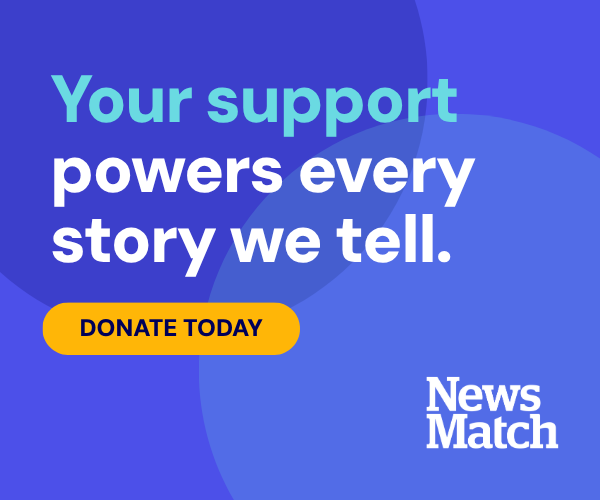Community Health & Wellness
During Childhood Cancer Awareness Month, locals share their stories and knowledge
Childhood cancer is rare. But Karen Caywood of Gig Harbor knows that it doesn’t seem that way when a doctor informs a parent their child has been diagnosed.
Health & Wellness Sponsor
Health and Wellness stories are made possible in part by Virginia Mason Franciscan Health, a proud sponsor of Gig Harbor Now.
“Once you’re told that your child has childhood cancer, it’s not rare anymore. It’s infuriating, and feels so dismissive to be told that it’s rare,” she said. “Only 4% of national cancer research goes to childhood cancers. That hasn’t changed since my son was diagnosed nine years ago.”
Caywood’s son, Cooper, was a sixth-grade student at Goodman Middle School in Gig Harbor when doctors diagnosed him with Avolar Rhabdomyosarcoma, a soft-tissue cancer. According to the National Institutes of Health, it makes up just 3% of all childhood cancers.
He lost his battle in 2018, and Caywood feels strongly that childhood cancer research should receive more funding.
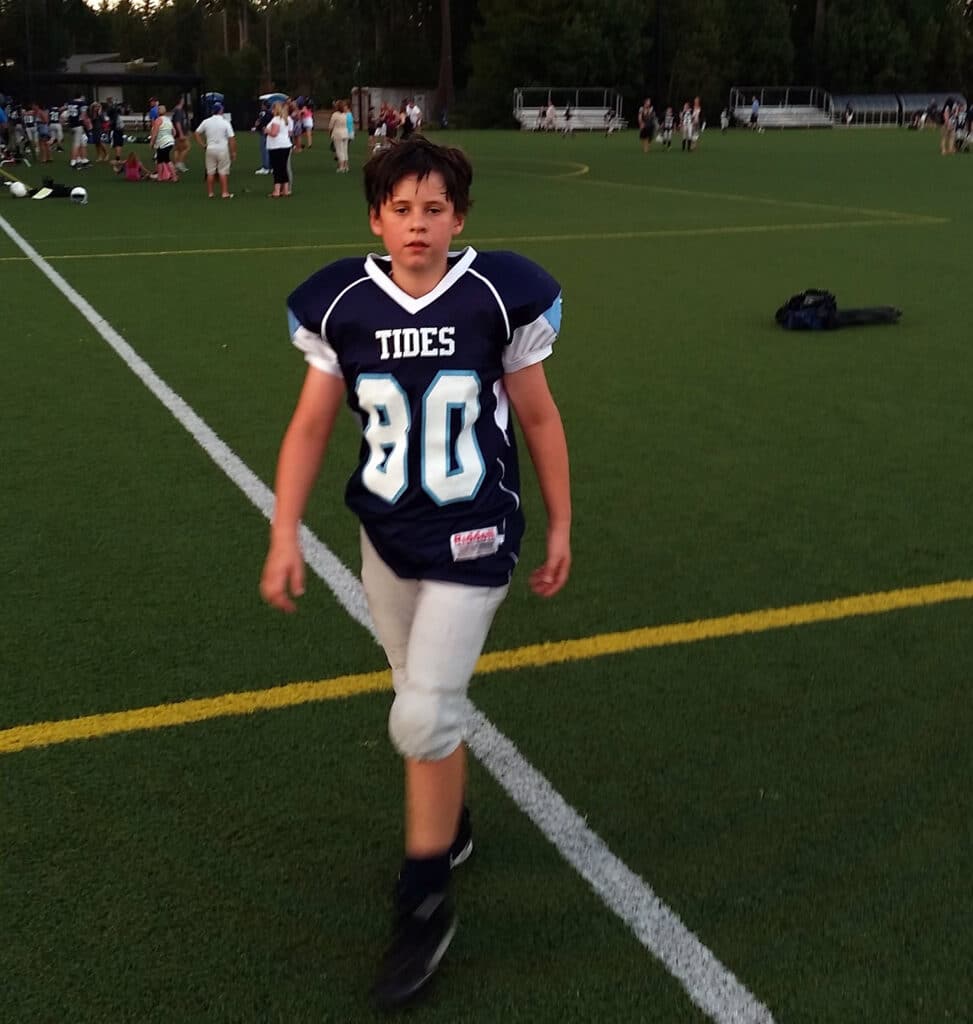
This photo of Cooper Caywood was taken just a couple of weeks before doctors diagnosed him with Aveolar Rhabdomyosarcoma. He fought it with treatments at Mary Bridge Children’s Hospital, and Seattle Children’s, as well as a trial of treatment in Oregon. He died in 2018 at the age of 14. Photo courtesy of the Caywood family
Childhood Cancer Awareness Month
Practically everyone knows that October is Breast Cancer Awareness Month, and that a pink ribbon is its symbol.
Fewer people know that September is National Childhood Cancer Awareness Month, so designated in 2010 by President Barack Obama. A gold ribbon symbolizes childhood cancer.
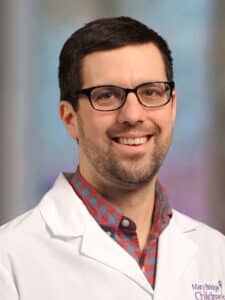
Dr. Jacob Henderson
The most common forms of pediatric cancer are leukemia and lymphoma, followed by brain tumors, said Dr. Jacob Henderson of Fox Island, an oncologist at Mary Bridge Hospital in Tacoma. Mary Bridge is one of two hospitals in the region with a children’s oncology department, along with Seattle Children’s Hospital.
Henderson said advancements in childhood cancer research are typically slow and incremental, with an occasional big win. One such big win came recently.
“In the last few weeks a clinical trial concluded that a new agent improves leukemia outcomes by 10 to 15 percent, and that is huge,” Henderson said. “It isn’t traditional chemo, so we’re getting a huge benefit with minimal toxicities.”
Monitoring the progress as well as any side effects is an important part of the regimen, Henderson said. Mary Bridge enrolls patients in Project Every Child, which monitors effect of their cancers, conducts specialized testing and keeps tabs on experimental or clinical trial options.
Working together
Project Every Child is a registry open to all pediatric cancer patients. The study collects information, including tissue that is stored in the Children’s Oncology Group’s data center. Scientists can then link laboratory findings to the outcome data. This helps both current and future advances in childhood cancer developments towards a cure, according to Project Every Child.
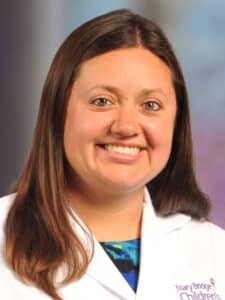
Dr. Vanessa Tolbert
The Children’s Oncology Group is the world’s largest pediatric cancer research cooperative, part of the National Clinical Trials Network. The group gathers data on pediatric cancer patients from across the country to come up with the best protocols for each type of cancer, said Dr. Vanessa Tolbert, a Mary Bridge pediatric oncologist.
“Pediatric cancer is rare,” she said, “no one place gets enough research to move it forward, so we coordinate across the country for research and trials to guide treatment. So, whether you’re diagnosed in Alabama, or here, you get the same treatment.”
Family support
While doctors use pharmaceuticals to try to get the body back to health, the emotional side of this new reality is daunting for both patients and parents. Even the youngest patient has to endure the break in their normal routine, and strangers poking and prodding. A big part of what pediatric oncologists do is partner with support staff, Henderson said.
“We have a huge support for psychological and developmental needs of the patients, and support through social work,” he said. “They help with coping with this new challenge, and help parents and siblings. They help with financial needs and transportation.”
That program is called Child Life Services. It helps teach children coping skills, like how to sit still through a scan, and helps with fears, he said.
“The challenges are very much front-of-mind for us,” Henderson said. “It’s not something we put on the back burner. From day one we have active support and resources for those things.”
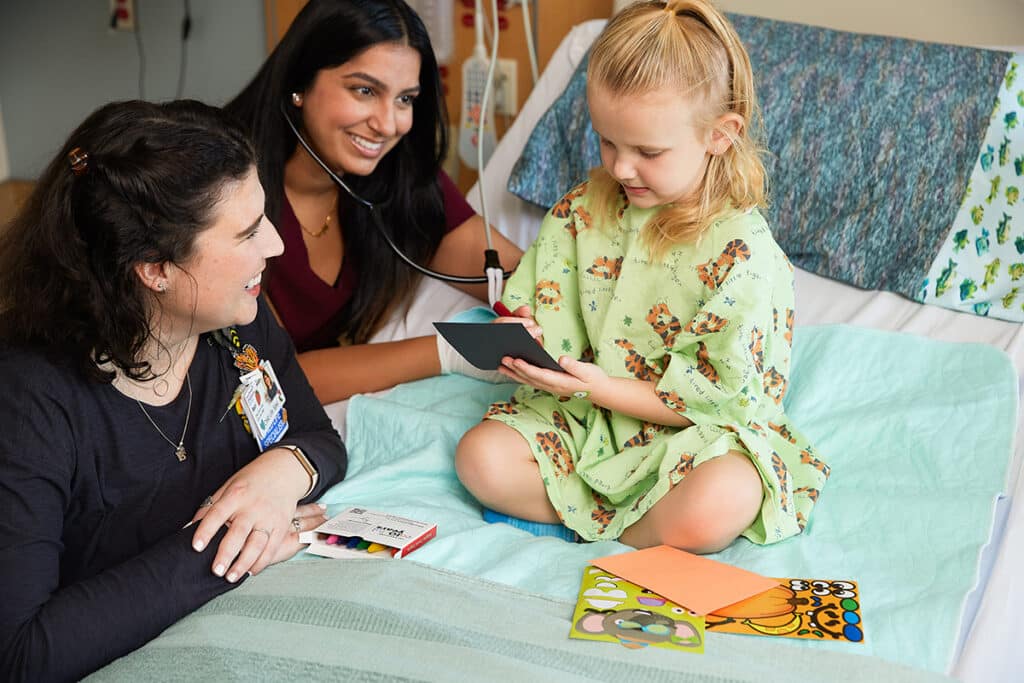
Bari Bates, a child life specialist, registered nurse Samridhi Singh work with a patient at Mary Bridge Children’s Hospital in Tacoma. Photo courtesy Mary Bridge
Coping — whether as the child being diagnosed, or the fears and uncertainty of friends, classmates and family members — led Brady Lucas to write a children’s book called Smiley’s Smile. Lucas, who published the book on Amazon in May 2023 and moved to Gig Harbor in November 2023, regularly speaks to civic groups and approached schools, children’s hospitals, specialists and nurses across the country.
Advocating for patients and families
Lucas grew up in Pennsylvania. Doctors diagnosed him with Acute Lymphoblastic Leukemia, the most common type of pediatric cancer, when he was 8 years old. His cancer relapsed in 2010, when he was 14. He said that he has been in remission since 2010, but the treatments have had an impact on his health.
“My platelet count is very low, in the 40s instead of the normal 450,” he said. “I have liver fibrosis, and on top of that, esophageal polyps, an enlarged spleen, and the mental effects of it.”
The physical effects of chemo during the treatment were very difficult. The trauma of being diagnosed and told he had a 30 to 50 percent chance of living at age 14, and the toll that it all took on his family, was tough, too.
All that led him to advocate for patients and families. He chooses to do that through writing.
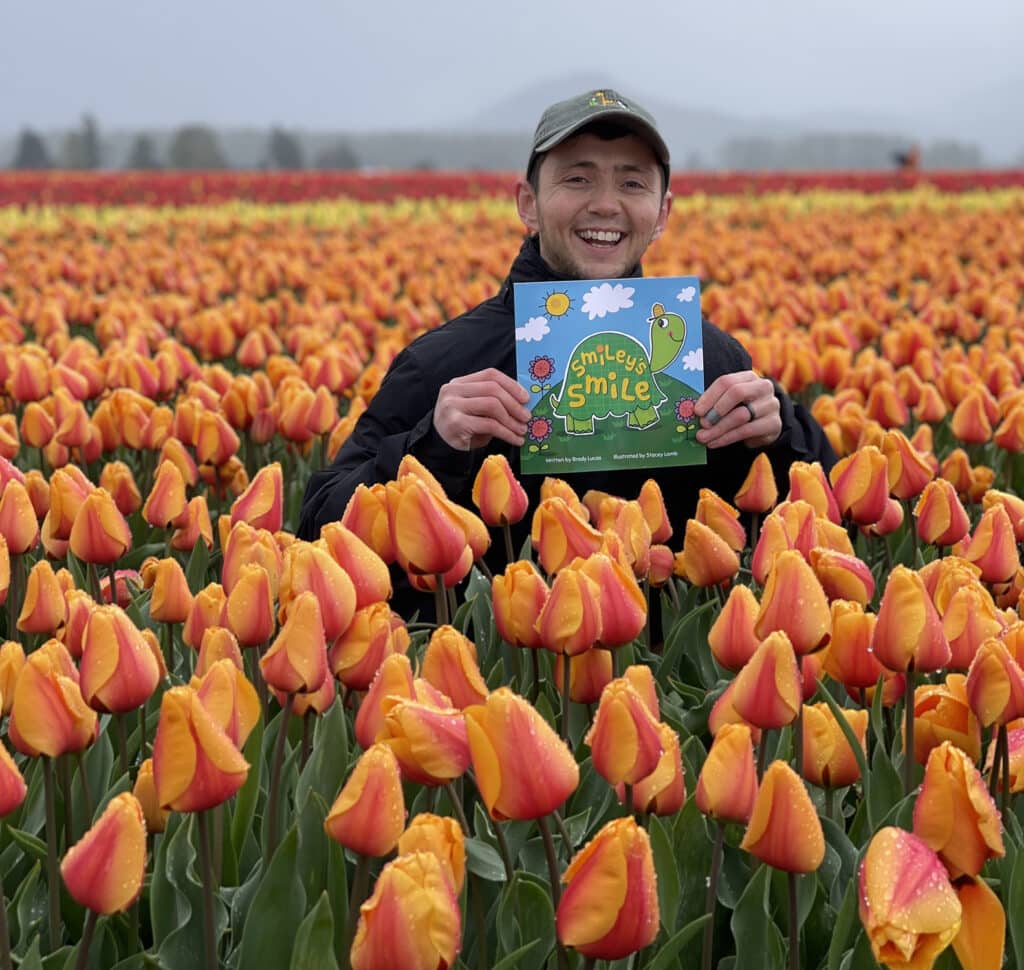
Brady Lucas is the author of a children’s book, Smiley’s Smile. Ever since doctors diagnosed Lucas with cancer as a child, he has since made it his mission to empower children fighting the disease. Photo courtesy of Brady Lucas
Lucas, who has a master’s degree in education with a focus on children’s literature, wants to empower children to be a part of their health-care experience.
“The reality is that more people are getting diagnosed and children need resources to help cope through the emotions, whether it’s themselves, or a friend or mom or dad, or even someone in their community is diagnosed,” he said. “When I was originally diagnosed in third grade, the teachers had to explain what was going on, so the main area is how to get this into schools.”
How to help
Karen Caywood of Gig Harbor recommends several organizations for people who want to support childhood cancer research, and children and families who are dealing with a cancer diagnosis. They include:
- Children’s Cancer Therapy Development Institute.
- Alex’s Lemonade Stand Foundation for Childhood Cancer.
- St. Baldrick’s Foundation, a childhood cancer research charity.
- Locally, the Rachel Lynn Henley Foundation works to support childhood cancer fighters and their families.
- Another local charity called Love Like Crazy provides financial support to medically fragile children and bereaved pediatric families.
- The Good Times Project is a charity and a community for families affected by childhood cancer. You can also find them on Facebook.
- St. Jude’s is a research hospital that provides care free of charge. However, Caywood said a patient has to be invited to St. Jude’s, depending on the type of cancer the hospital is studying
- Smiley’s Smile by Brady Lucas, illustrated by Stacey Lamb, is available on Amazon. Reach Lucas at bradylucasauthor.com.
- There are a number of ways to support Mary Bridge Children’s Hospital, which treats pediatric patients for all childhood illnesses, including cancer. One is Child Life Services, whch supports patients while they are in the hospital and during visits and procedures. To donate to the Mary Bridge Children’s Foundation visit https://www.marybridge.org/support-mary-bridge/.
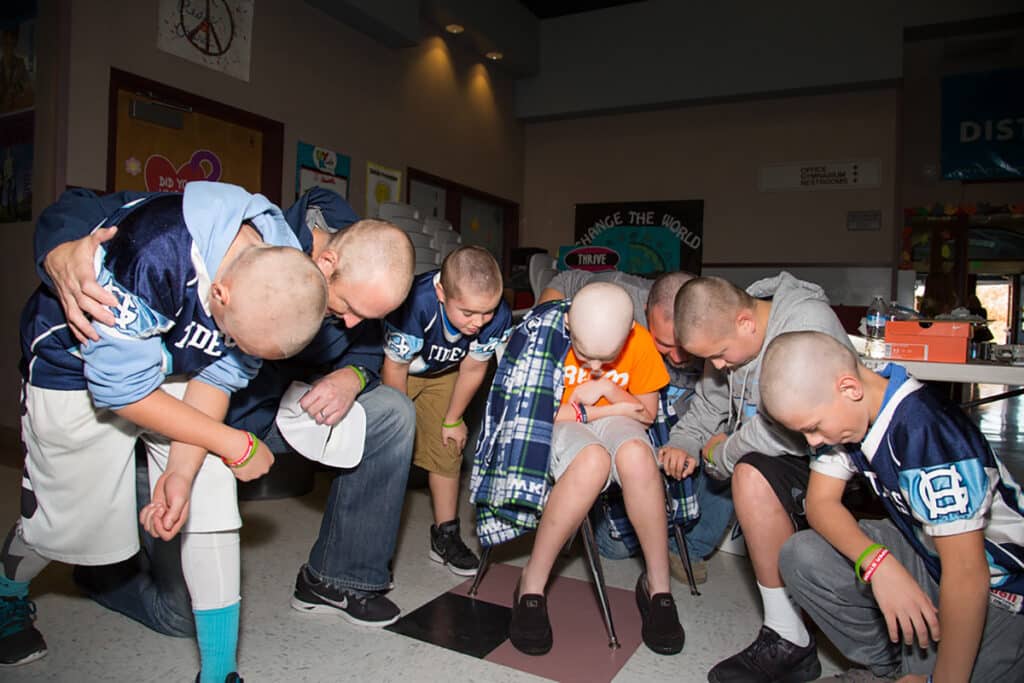
Cooper Caywood’s Peninsula Youth Football teammates and coach participated in the St. Baldrick’s Brave the Shave event in November of 2015. Cooper began treatment in August of that year. Photo courtesy of Karen Caywood


